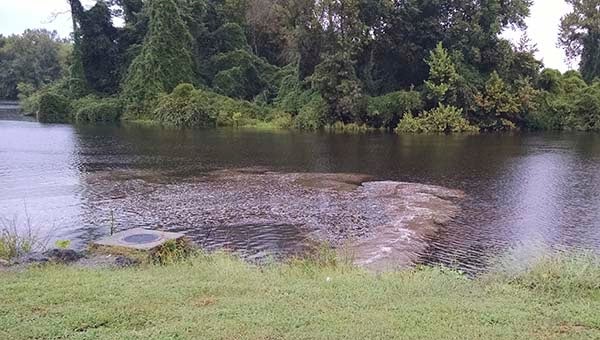Heavy rain causes Franklin treatment plant to overflow
Published 10:10 am Wednesday, September 10, 2014

Heavy rains on Monday caused waste from the Franklin water treatment plant to overflow into the Blackwater River. — Submitted | Jeff Turner
FRANKLIN—Around 5:15 p.m. on Monday, Riverkeeper Jeff Turner was keeping an eye on inflow into the Blackwater River from Franklin’s wastewater treatment plant.
Turner said that every time 5 to 6 inches of rain falls, the sewage plant overflows and the waste entering the river is no longer clear.
“When nobody is there on the weekends, there is no way for that to get caught, so it just runs,” he said. “I knew it was going to be raining like hell yesterday, and I know they did too. What I don’t understand is why they don’t monitor it more closely.”
It’s a reoccurring issue, and he worries about the pathogens being leaked into the river, such as E. Coli, and the “fertilizer” also brings algae that feeds on the waste. The problem, however, is that they take up oxygen, Turner said. A large number of algae can hurt the ecosystem.
Turner also worries about what would happen if he was not there to catch it.
“What if they leave at 5:30, and it starts happening at 6 p.m., runs all night and clears up by 4 a.m.?” he asked. “That’s millions of gallons of it in the river that nobody would know about.”
Wastewater Treatment Plant Manager Donnie Cagle said that when he left at 4:30 p.m. the system had 4 million gallons, which was twice the capacity the system was built for. A little after 5 p.m., the system was up to 5.8 million gallons and it overflowed from the tanks.
Cagle said overflowing is a normal part of the process — the problem was that the way it usually works, 99.9 percent of the time, is that the water enters the tank at a much slower rate and and the solids are not displaced from the bottom where they accumulate.
So from there a clear liquid would normally go through ultraviolet light treatment and slowly filter into the river and go through the process 100 percent.
When it rains, however, the UV light treatment would not be effective as the liquid coming through is not clear. So instead, they set up with an older system where they add chlorine, which kills the pathogens, such as E. Coli, and then they de-chlorinate it before releasing it into the river.
“It is unsightly,” Cagle admitted, “but it is not dangerous to the public or aquatic life.”
The waste is 90 to 95 percent along in the process, he added. The treatment plant is taking no short cuts as far as treatment, just that the solids which color the water are not normally released in that method.
As far as the nutrients being released that attract algae, Cagle said it was still within the permit parameters set by the Department of Environmental Quality. It will attract the algae, but not anymore than what is usually released, whether crystal clear or mud-colored.
Once it starts leaking, Cagle said, there’s nothing that they can do about it except let it go through the process so that it will be as harmless as possible to the environment.
“By the time we get to overflowing capacity, we have done as much as we can in house,” he said.
The only ways to fix it, Cagle said, are to increase capacity at the plant or go through and fix the inflow system.
Some of the pipes in Franklin’s collection system are 50 to 60 years old, and they’ve got fractures that enable stormwater to find its way in, which increases how many hundreds of thousands of gallons of water that the system gets each day.
Turner said that as long as they are waiting on the study to tie into the Southampton County wastewater treatment system, he didn’t think they would do anything to fix the current system.
“If the DEQ doesn’t fine them, there is no incentive for the city to work on it,” he said. “Nobody wants to spend any extra money on it.”
Cagle said in the past 15 years since he has been working at the plant, Franklin has not been fined by the DEQ in regard to the treatment plant.
Russ Pace, public works director, said that Franklin Public Works would not be negligent when it comes to the environment.
“DEQ is one of the most powerful governing organizations that Virginia has,” he said. “I would not risk the 30 years that I have worked my tail off in construction and in public works to be out there purposely doing something wrong that is harmful to the environment.”
To add to that, Pace said that Franklin works well with the DEQ. When the DEQ comes to Franklin and talks about a change that isn’t required by law, they always consider it and most of the time they implement it.
“We don’t run and hide from the DEQ,” Pace said. “We do things the way they are supposed to be done and the way they need to be done.”





